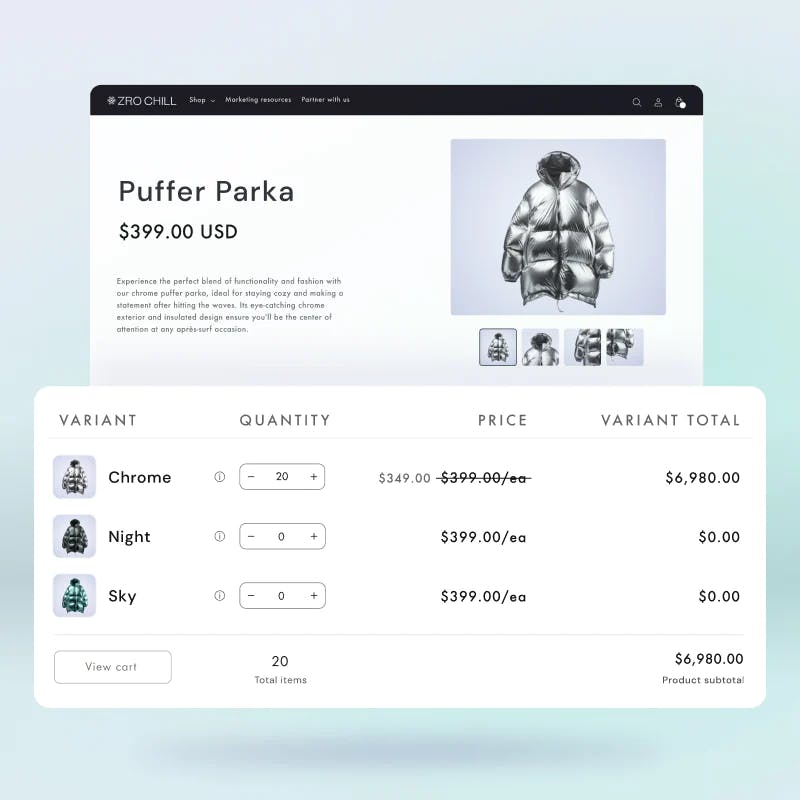Shopify's Winter Editions: Enhanced B2B features in 2024

Though Shopify might have experienced some initial delays in enhancing its B2B capabilities, with the latest updates, it's swiftly narrowing this gap, strengthening Shopify's B2B offering significantly.
With the recent Winter Editions announcements, the leading SAAS platform has once again demonstrated its commitment to revolutionising online commerce.
We were invited to London by Shopify a few weeks ago to delve deeper into these developments. Here, we outline our key insights.
What is a Shopify Edition?
Shopify Editions is a periodic update from Shopify that showcases the latest features, updates, and improvements introduced to the platform.
Each edition typically focuses on a specific theme or set of features, such as advancements in ecommerce technology, new tools for merchants, and trends in online shopping, aiming to keep users informed and equipped with the latest ecommerce solutions.
Individual pricing for B2B clients
Ensuring that each customer receives pricing that aligns with their unique requirements and purchasing history is an essential feature for the majority of B2B operations.
Shopify's Custom Discounts introduce a powerful tool that helps merchants offer personalised pricing to individual B2B clients in a sector where flexibility and customisation are paramount.
With Custom Discounts, merchants have the flexibility to set up tiered pricing structures, volume-based discounts, or even negotiate pricing on a case-by-case basis.
This level of customisation enables businesses to nurture stronger relationships with their B2B clients by demonstrating an understanding of their specific needs and preferences.
From a practical standpoint, setting up these Custom Discounts in Shopify is straightforward. Merchants can easily configure discount rules based on factors such as order quantity, order value, or customer group.
They can also schedule discounts to run for a specific duration or apply them automatically at checkout, simplifying the process for both merchants and customers.
A dedicated B2B theme

Source: https://www.shopify.com/uk/editions/winter2024
Shopify have also announced their new theme, “Trade”, crafted explicitly for B2B enterprises, designed to expedite the setup process while delivering a tailored experience for wholesale businesses.
This out-of-the-box solution should revolutionise the way B2B transactions are conducted, offering an array of features curated to streamline operations and enhance customer satisfaction.
The Trade theme is optimised to meet the diverse needs of B2B enterprises, offering robust features and capabilities to support complex workflows and business logic. It is designed with scalability in mind, ensuring that businesses can grow and evolve without limitations.
As companies expand their product offerings, customer base, or market reach, Trade can easily adapt to accommodate changing requirements and accommodate future growth.
Trade's customisable nature empowers businesses to tailor the theme to their specific needs and branding guidelines. From tweaking colour schemes and typography to configuring layout options and product displays, merchants have full control over the appearance and functionality of their storefront.
This flexibility ensures that Trade seamlessly integrates with the unique identity and requirements of each B2B business, providing a cohesive and immersive shopping experience for customers.
The Trade theme isn’t released just yet (correct in early March 2024) but you can sign up for updates on the Shopify Editions Winter ‘24 landing page.
Headless B2B storefronts
In the ever-evolving landscape of B2B ecommerce, adaptability and scalability are paramount. Recognising this, Shopify's Winter Editions B2B announcements have brought the power of Headless storefronts to their B2B functionality.
This innovative approach to architecture decouples the front-end presentation layer from the back-end ecommerce functionality, offering unparalleled flexibility and scalability for B2B businesses.
Headless B2B architecture enables merchants to leverage the power of Shopify's robust back-end infrastructure while using their preferred front-end technology stack. This means businesses can create highly customised and immersive business-to-business user experiences tailored to their brand identity and customer preferences.
Shopify’s composable B2B commerce APIs allow you to integrate Shopify into nearly any technology stack, so you have the freedom to use the frameworks, hosting, and workflows that work best for you.
The release of Shopify Editions Winter ‘24 brings B2B checkouts, personalised products and prices using the Storefront API, Customer Accounts API, and developer tools.
Additional Innovations for B2B eCommerce
In addition to these features, Shopify introduces partial payments, non-physical products and an off-the-shelf integration with an intuitive cloud ERP system.
Partial Payments
The new partial payments features enable businesses to provide their B2B customers with more flexibility by allowing them to use multiple payment methods for a single order. They can make partial payments, such as deposits or upfront payments via a ‘vaulted’ credit card, direct bank deposit, or even via a new credit card.
Non-physical products
Non-physical products cater to the increasing demand for digital services, software, warranties and downloads.
These types of products offer businesses valuable tools and resources to improve operations, enhance productivity, and foster growth without the need for physical delivery, thereby streamlining procurement and deployment processes.
ERP Integration
Until now, businesses had to rely on oversized and expensive cloud storage solutions with poor navigation options, limited storage tiers and little or no analytics. Shopify’s new support for B2B digital products helps users to create, share, track and even sell their digital services, software, warranties and downloads.
Shopify has also partnered with Acumatica to bring the functionality of an enterprise cloud ERP system capable of managing manufacturing, construction, distribution and retail in one place.
Users will be able to manage the entire customer lifecycle inside Shopify’s platform with native connectivity to Acumatica applications.
Over to you
Winter Editions ‘24 announcements represent another leap forward in B2B ecommerce on Shopify. Their initial B2B offering launched in 2022 and this winter sees a bunch of new and super-useful features to meet the diverse needs of businesses.
With innovations spanning pricing, theme design, architecture, and beyond, Shopify empowers B2B enterprises to thrive in an evolving digital landscape, driving efficiency, growth, and success. Which of these would you consider crucial for your business-to-business operations?
Some useful resources
More information on Shopify’s New B2B Functionality
How we designed and built a powerful ecommerce store on Shopify’s platform
A case study on how we used Shopify to build Muckle Brig’s ecommerce website






